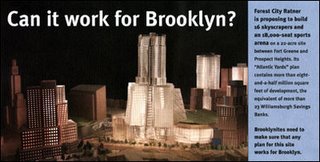 It turns out the strongest spin on last Thursday's Municipal Art Society forum came not from any of the groups critical of the Atlantic Yards project but BUILD, fervent supporters of the project.
It turns out the strongest spin on last Thursday's Municipal Art Society forum came not from any of the groups critical of the Atlantic Yards project but BUILD, fervent supporters of the project.The notably highminded session on design principles for the project was marked by some pre-meeting skirmishing among community groups critical of or opposed to the plan, and even by some press releases issued before the session began.
And, as Neil de Mause observed in the Village Voice's Power Plays blog: [MAS president] Kent Barwick insisted he didn't want to make simplistic headlines, he made them nonetheless with the declaration that "the [Ratner] plan in its current state would not work."
BUILD misreads meeting
 Then there is BUILD. The organization, which has vigorously advocated for the Atlantic Yards plan at various public meetings, gets free office space from Forest City Ratner, and receives significant funding from the developer (though representatives at first denied they got such money).
Then there is BUILD. The organization, which has vigorously advocated for the Atlantic Yards plan at various public meetings, gets free office space from Forest City Ratner, and receives significant funding from the developer (though representatives at first denied they got such money).BUILD sent a message to supporters that was not merely simplistic but thoroughly distorted the purpose of the meeting. "Come out to support affordable housing, jobs and business opportunities for our community," the flier said. There was no mention of the Municipal Art Society.
The flier went on to list the groups and political figures sponsoring the MAS session--groups that actually were careful not to endorse the MAS's conclusions--and declared that they are "trying to STOP Jobs, Affordable Housing And The NETS Arena and Opportunities from coming to our community. Over Fifty (50%) percent of Black Men in OUR Community are unemployed."
"Please come out and support the nets Arena and The Atlantic Yards Project," it continued. There was no reference to the MAS's attempt to assess design guidelines for the project.
While some BUILD officers and representatives of affiliate groups were at the meeting, no large contingent was obvious.
BUILD and unemployment
Recently, city Council Member David Yassky asked for $3 million from the City Council to fund BUILD, under the weak explanation, from spokesman Evan Thies, that “There is an eight-and-half percent unemployment rate in [the area] and that is not going to go down unless there is more access to job-training programs.”
There's obviously a need for jobs and training for black men in Brooklyn--and other Brooklynites as well. Should public funding for the privately-negotiated Community Benefits Agreement--and a signatory with no previous record in job training--be the priority?
Also, the source of BUILD's unemployment figures--and the definition of the community boundary--is unclear. A BUILD press release states that "[t]here is a 78% unemployment rate in the Fort Greene housing project and a 66% unemployment rate within the Farragut housing project."
As for black unemployment in the city, the New York Times reported last year on a study that said 60.7 percent of working-age black men in the city had jobs. That does not, however, mean that 39.3 percent are unemployed, because the study didn't count those who "neither sought nor wanted a job, such as students, stay-at-home fathers, early retirees, and the disabled, among others."
Equally unclear is how much of a dent the project could make. The Community Benefits Agreement, as the New York Observer reported last December, does set aside some construction jobs for minorities:
The agreement sets a goal of employing 35 percent minorities—a reasonable and achievable threshold which Forest City has met on its other projects. In other words, 525 jobs—not reserved for public-housing residents, or even residents of Crown Heights and Bed-Stuy, but for minorities from all over the metropolitan region.
But any jobs and benefits also should be seen in the context of direct subsidies and public costs that would be well over $1 billion. It's all part of a larger debate that goes beyond assertions that the MAS session was about stopping jobs and affordable housing.
Comments
Post a Comment